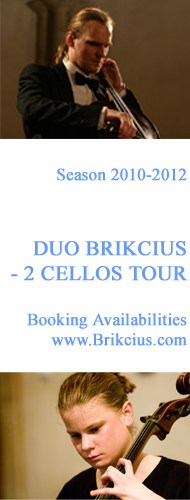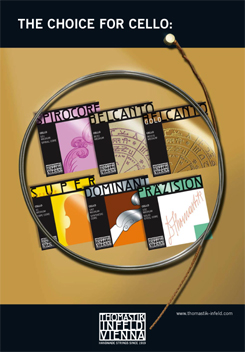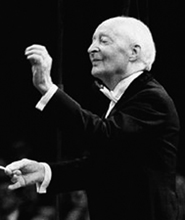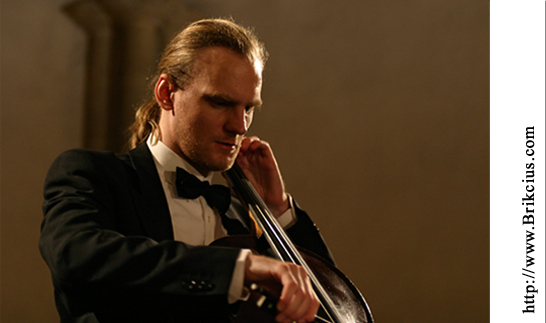Newsletter 14 (December 2010)
Invitation: Advent concerts Na Prádle & "Duo Brikcius - 2 Cellos Tour"  You are invited to
Advent concerts Na Prádle "Duo Brikcius - 2 Cellos Tour",
concert of two Czech cellists (and siblings) Anna
Brikciusová and František Brikcius. Concert will be on Sunday
19th December 2010, 6pm, at the Kostel sv.
Jana Křtitele Na Prádle (Říční ul. 6, Praha 1,
Czech Republic).
In addition to Fantasie IV (2008) by the Czech composer and organist Irena Kosíková, Duo Brikcius will play Duo for Violin and Cello (1939-40) by Terezín composer Gideon Klein, as arranged for two cellos. Concert will feature music by L. Boccherini, W. A. Mozart, G. Rossini, P. Hindemith, G. Klein and I. Kosíková as well. In the cooperation with the CČSH - Kostel sv. Jana Křtitele Na Prádle. More info is available on websites http://www.Brikcius.com , http://www.Husiti.Majestat.cz and http://www.iKosik.com . DUO BRIKCIUS - 2 CELLOS TOUR
Sunday 19 December 2010, 6pm,
Kostel sv.
Jana Křtitele Na Prádle (Říční ul. 6, Praha 1,
Czech Republic)
ANNA BRIKCIUSOVÁ - Cello (Duo Brikcius) FRANTIŠEK BRIKCIUS - Cello (Duo Brikcius) Competition: Win 1 x set of Cello Strings Thomastik BELCANTO
 Win 1 x set of Cello
Strings Thomastik BELCANTO, by answering following question:
How many
composers are associate with cello project "eSACHERe", initiated in the
occasion of the 70th birthday of Swiss conductor and maecenas Paul
Sacher (1906 - 1999), by Russian cellist Mstislav Rostropovich?
Contest is over, lucky winner is M. Ch. from Peking.
Partner of the Month: Prague.TV  A comprehensive guide to the
Golden City, Prague TV is the number-one place to
reach the Czech Republic’s international community. Prague TV is a
complete guide to living in the Czech capital: from helping foreigners
find jobs, new homes, or a good school, to tips on entertainment,
restaurants, hotels, bars, and out-of-town escapes.
Started in 2001, Prague TV has grown into the web’s most visited source for information on Prague and the Czech Republic. The site contains hundreds of thousands of pages, is updated daily and covers all aspects of life in Prague, both for visitors and residents. Prague TV is media partner of projects "MAKANNA" and "eSACHERe". Meet ... Composer Witold Lutosławski  Witold Lutosławski (*25. 01. 1913 - †7.02. 1994) Polish composer and
conductor
Witold Lutosławski was born, to politically and culturally active
family, on 25th January 1913 in Warsaw. In September 1918, when
Lutosławski was five, father Jósef Lutosławski and uncle
Marian Lutosławski were executed by Bolsheviks firing squad in
Butyrskaja prison in Moscow, just few days before their planned trial.
After the World War I., rest of the family returned to new independent
Poland. Lutosławski started to learn play piano when he was six
years old. He further studied at the Warsaw Conservatory, graduated in
1936 with piano diploma and in 1937 with diploma for composition.
Signalling and radio operating at the Military service followed. His plans to continue with musical studies in Paris were interrupted by German and Russian invasion of Poland, when Lutosławski was mobilised with the Krakow radio unit, soon captured by German soldiers. He managed to escape being marched to prison camp and walked 400 km to Warsaw. His brother was captured by Russian soldiers, and later died in a Siberian labour camp. To earn a living, Lutosławski joined a cabaret group playing popular dances. He also formed a piano duo with friend and composer Andrzej Panufnik, and they performed together in Warsaw cafés. In German occupied Warsaw, listening in cafés was the only access to live music. In café Aria, where they played, Lutosławski met his future wife Maria Danuta Bogusławska, a sister of the writer Stanisław Dygat. Lutosławski left Warsaw with his mother a few days before the Warsaw Uprising of 1944, salvaging only a few scores and sketches the rest of his music was lost during the destruction of the city. Lutosławski returned to the ruins of Warsaw after the Polish-Soviet treaty in April 1944. In 1945, Lutosławski was elected as secretary and treasurer of the newly constituted Union of Polish Composers (ZKP - Związek Kompozytorów Polskich). In 1946, he married Maria Danuta Bogusławska. Because he was implacably opposed to the ideas of Socialist realism, in 1948 he was dropped from the ZKP committee, following Stalin's artistic censorship. His First Symphony was proscribed as "formalist", and he found himself shunned by the Soviet authorities, a situation that continued throughout the era of Khrushchev, Brezhnev, Andropov and Chernenko. In 1954, the climate of musical oppression drove his friend Andrzej Panufnik to defect to the United Kingdom. Stalin's death in 1953 allowed a certain relaxation of the cultural totalitarianism in Russia and its satellite states. In 1954 Lutosławski received, much to the composer's humiliation, the Prime Minister's Prize, for a set of children's songs. Following four years is Lutosławski working on his Music of mourning (1958), which was written to commemorate the 10th anniversary of the death of Béla Bartók, this work brought international recognition, the annual ZKP prize and the UNESCO prize (1959). In years 1957-1963 Lutosławski composed waltzes, foxtrots and tangos under the pseudonym Derwid. First commission from abroad (Zagreb music biennale, 1963) earned him another State Prize for music and agreement with music publishing house Chester music. Following performances of his work in Sweden (1965) and at the Aldeburgh Festival, founded by British composer and friend Benjamin Britten. Cooperation with Pierre Boulez who conducted his work. In 1967 Lutosławski received Denmark's highest musical honour the Sonning Award (1967), followed by first prize from the UNESCO's Tribune internationale des compositeur (1968). Creation of his Cello Concerto (1968 - 1970), premiered by Russian cellist Mstislav Rostropovich, was deeply affected by the death of Lutosławski's mother in 1967 and by suppression of liberal political activities. In 1981-1989 Lutosławski refused all professional engagements in Poland as gesture of solidarity boycotted artists. In 1983, as a gesture of support, he sent a recording of the first performance of the Third Symphony to Gdańsk to be played to strikers in a local church. He was awarded the Solidarity prize (1983) and the first Grawemeyer Prize from the University of Louisville, Kentucky (1985), that allowed him to set up a scholarship enable young Polish composers to study abroad. In 1987 he was awarded with the Royal Philharmonic Society's Gold Medal and major celebration of his work was made at the Huddersfield Contemporary Music Festival (1987). In addition, he was awarded honorary doctorates at several universities worldwide, including Cambridge. After substantive talks had been arranged between the government and the opposition, Lutosławski returns to the conductor's podium in Poland at the Warsaw Autumn Festival (1988). Following events in 1989, Lutosławski took on the presidency of the newly reconstituted "Polish Cultural Council". In 1993 Lutosławski travelled to the United States, England, Finland, Germany, Canada and Japan. He had been awarded Poland's highest honour, the Order of the White Eagle. Hi died on 7th February 1994. His wife Danuta died shortly afterwards. Together with another 11 composers - friends (C. Beck, L. Berio, P. Boulez, B. Britten, H. Dutilleux, W. Fortner, A. Ginastera, C. Halffter, H. W. Henze, H. Holliger, K. Huber a W. Lutoslawski) of Swiss composer and maecenas Paul Sacher (1906 - 1999), he was asked by Russian cellist Mstislav Rostropovich on the occasion of Sacher's 70th birthday to write composition for cello solo with use of notes creating his name (eS, A, C, H, E, Re). Witold Lutosławski created SACHER - VARIATIONEN. Compositions were partially presented in Zurich on 2nd May 1976. Whole "eSACHERe" project will be (for the first time in complete performance) performed by Czech Cellist František Brikcius in 2011 in Prague. For more about
Witold Lutosławski visit http://www.Brikcius.com and http://En.Wikipedia.org/Wiki/Lutoslawski
.
Call for ... 10th December - Human Rights Day  |


